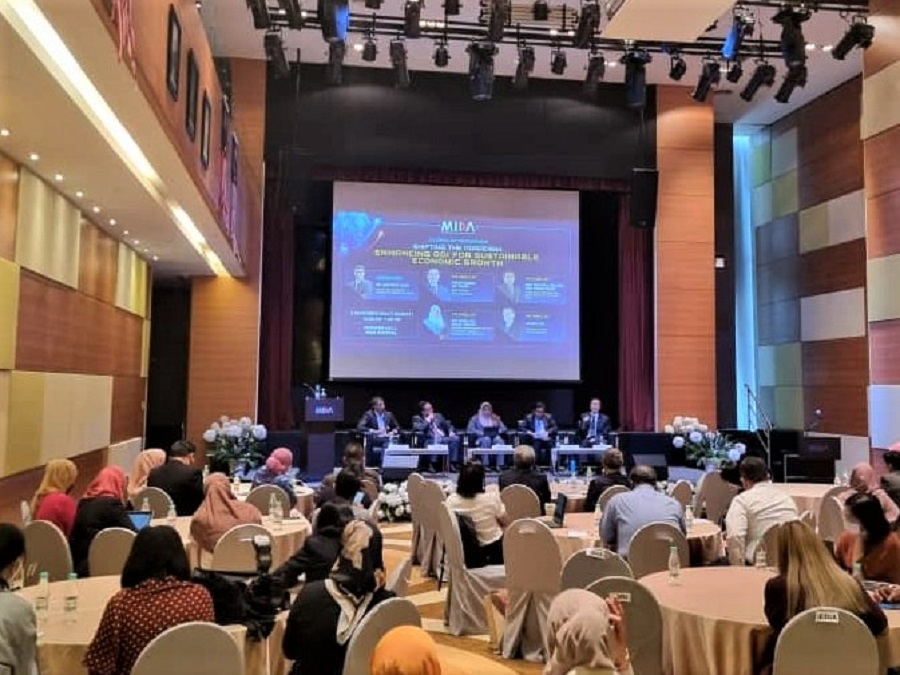The Malaysian Investment Development Authority (MIDA) hosted the 3rd Journalist Programme, which featured an expert panel discussion titled “Shifting the Paradigm: Enhancing Domestic Direct Investment (DDI) For Sustainable Economic Growth”. The session aimed to highlight the importance of DDI in contributing towards the country’s economic growth and to dispel the widespread misconception that the Government prioritises promotion to attract Foreign Direct Investment (FDI). In reality, the Government places equal importance on attracting both FDI and DDI.

Subscribe to our Telegram channel to get a daily dose of business and lifestyle news from NHA – News Hub Asia!
MIDA Chief Executive Officer, Datuk Wira Arham Abdul Rahman in delivering his welcoming remarks emphasised the importance of DDI to the local economy. “For the past 10 years (2012-2021), FDI contributed 35.8 per cent or RM761.7 billion, while domestic sources accounted for 64.2 per cent or RM1,364.6 billion in all sectors of the economy. In absolute terms, the services sector saw the highest level of approved investments (RM1.2 trillion), followed by manufacturing sector (RM818.4 billion) and primary sector (RM103.7 billion). We must understand that FDI is only one part of the equation, and a strong domestic industry and ecosystem are also important.
Foreign Direct Investment (FDI) and Domestic Direct Investment (DDI) complement one another. They arise from the same market conditions: a competitive, equitable, stable business and regulatory climate. Strong domestic demand results in more DDI and a healthy DDI is essential for successful FDI.”
The interactive session was moderated by Group Chief Economist/Head of AmBank Research, Dr. Anthony Dass, with panellists comprising, Senior Executive Director of Investment Policy Advocacy of MIDA, Mr. Sikh Shamsul Ibrahim Sikh Abdul Majid, Director and Head of Research of MIDF Amanah Investment Bank Bhd, Mr. Imran Yassin Md. Yusof, Founder and Managing Director of CG Global Profastex Manufacturing Sdn. Bhd., Ms. Siti Padillah Abdul Wahab, and Strategic Advisor of ViTrox, Mr. Lim Wei Yee.
In kicking-off the panel discussion, moderator Dr. Anthony Dass stated his confidence that Malaysia will enjoy a thriving economy in 2023 despite the backdrop of a challenging global economic outlook. “The country is experiencing growth with more jobs, higher wages, stable inflation, and sound public finances and anticipates steady growth in DDI as borders reopen, healthy consumer spending, and more inflow of FDI.” he added. Panellist Mr. Sikh Shamsul Ibrahim highlighted “MIDA has formulated and executed strategic programmes to continue facilitating the establishment and expansion of multinational corporations (MNCs) and local large companies (LLCs) as well as mid-tier companies in Malaysia.
Equipped with a structured and completed ecosystem in various industries, we promote strategic collaborations between domestic companies with MNCs and LLCs to become part of local supply chains with technological capabilities. To date, MIDA has managed to engage with over 30 MNCs and LLCs which involved more than 150 potential local suppliers.”
MIDA has been proactive in creating opportunities for domestic companies and mitigating gaps in the supply chain. Such initiatives have helped develop and upgrade domestic companies and encouraged them to adopt new technologies, smart manufacturing and Industry 4.0 practices. The new Digital Transformation Ecosystem (DTE) has enabled to realise such aspiration to integrate such an advantage into the production processes. Investors should see disruptive technology as an opportunity rather than a threat, and the
results speak for themselves. For instance, the MIDA-PERODUA DTE programme is indeed a success story to train and upgrade the carmaker’s vendors through modern technology.
Another panellist Mr. Imran Yassin, Director and Head of MIDF Research asserted “Reviving DDI was crucial in raising the economy’s productive capacity, accelerating technological progress, creating employment opportunities and expanding exports with the implementation of the Regional Comprehensive Economic Partnership (RCEP). As Malaysia becomes the ninth country to ratify the Comprehensive and Progressive Agreement for Trans-Pacific Partnership (CPTPP), businesses will benefit to further contribute to the Malaysia’s recovery.”
Ms. Siti Padillah, the Founder and Managing Director of CG Global Profastex Manufacturing Sdn. Bhd. shared that her company, a contract manufacturer in the electronics industry, has propelled itself as a key player in the E&E sector with MIDA’s assistance over the years. She also expressed her hope that MIDA could help to facilitate local companies as well as CG Global to align with the country’s principles of Environmental, Social and Governance (ESG) and National Investment Aspirations (NIA), which in turn ensure the country’s long-term growth. “Now, we are able to collaborate with universities and technical schools to develop dedicated programmes for future hybrid talents.”
Meanwhile, Mr. Lim Wei Yee, the Strategic Advisor of ViTrox Corp Bhd said “Small and Medium Enterprises (SMEs) in the manufacturing and manufacturing-related services sectors play major roles in building the nation’s industry ecosystem and the incentives
provided by the Government have helped to turn some local companies into global players. MIDA’s dedicated unit named Domestic Investment Coordination Platform (DICP) had provided the needed support to bridge the link between businesses and funding, technologies and research capability.”
Moving forward, MIDA will continue to intensify efforts to increase DDI to strengthen the
country’s economic recovery with the country transitioning to the endemic phase. Amidst
global economic headwinds, MIDA will continue to create a conducive business ecosystem to ensure the sustainability of business and overall economic growth.
Source: MIDA

